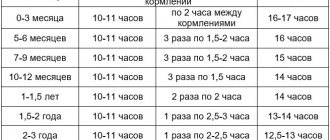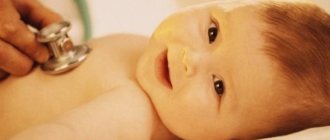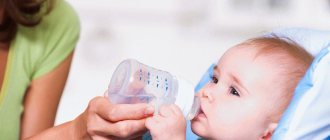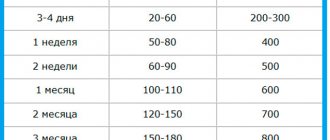What is considered regurgitation?
Sometimes some food is thrown back from the stomach into the esophagus, and then into the oral cavity and out. This is regurgitation. As a rule, this happens with infants.
Typically, regurgitation in newborns occurs immediately after the baby has sucked milk. But some time may pass, then curdled milk comes out.
This happens in completely healthy babies, but can signal a disease. The main thing is that the volume of rejected milk does not exceed 3 ml and this does not happen too often.
When to worry
Regurgitation is not a pathological process if it is observed during the first year of a child’s life. However, there are several nuances that you need to pay attention to and consult your doctor:
- the first cases of regurgitation appeared after 6 months of age,
- last more than a year
- occurs after each feeding,
- When regurgitating, a large amount of food is released,
- temperature increases.
It is advisable to undergo a consultation immediately after the appearance of fountain regurgitation, since other pathologies may be hidden behind it.
What time do babies stop burping?
Most likely, the baby will spit up in the first months after birth. Until the baby’s body recovers after birth and the stomach begins to cope with food, this is inevitable. But usually by the time the baby sits steadily, the problem goes away on its own. In any case, all healthy babies no longer burp when they take their first step. But be prepared for new manifestations during teething or when your baby is unwell.
The great science of statistics has revealed that regurgitation in babies under 4 months occurs in almost everyone. But if this phenomenon repeats too often and in large volumes, this is a reason to visit a doctor.
Therefore, if after each feeding the baby vomits more than 3 ml of stomach contents through the mouth or this happens constantly, it is necessary to undergo an examination and find out the reason. At what age does a child stop burping and is it harmful? Let's look at it further in the article.
Frequent regurgitation can lead to inflammation in the esophagus and other serious consequences in the digestive tract.
Newborn burps through nose and mouth
- Pyloric stenosis. Narrowing of the passage between the stomach and part of the intestines, leading to stagnation of food. As a result, the child begins to spit up simply profusely for the first two weeks, then a fountain, and after some time vomiting begins. The mass regurgitated by a child often has a curd-like consistency. The pathology is classified as dangerous and the child requires hospital treatment.
- Pylorospasm. The same narrowing as with pyloric stenosis, but caused by spasm of the pyloric muscles. In this case, you need to consult a doctor and switch to the mixtures and additional medications prescribed by him.
- Sphincter expansion. The opening between the stomach and esophagus is too wide. The doctor prescribes vitamins and calcium, and additional medications. Food is taken in fractional portions. It is acceptable to eat a small amount of cottage cheese.
- The child was born prematurely. In such children, the sphincter is less developed; in this case, the child will continue to regurgitate for up to six months, until he catches up with his peers in the development of the gastrointestinal tract.
- Pathologies formed during intrauterine development. These include disturbances in the functioning of the central nervous system, sleep disturbances, increased intracranial pressure, high excitability of the vomiting center, and more.
- Damage to the cervical spine. The child could have been injured during childbirth, which occurred with complications. Treatment here is prescribed by a neurologist, including special massage, physiotherapy, and medications.
The structure of the esophagus and stomach in a baby
Neurology
Spitting and a restless baby
Since regurgitation throws not only food into the baby's esophagus, but also acidic gastric juice, in some children, frequent regurgitation can lead to irritation of the esophagus, which is manifested by restlessness, which worsens when the baby is placed lying on his back.
Some parents describe this situation as follows: “We can’t put the baby on his back. As soon as we put him on the bed, he starts crying a lot and arches his back.”
In addition to irritation of the esophagus, in children, frequent regurgitation (regurgitation syndrome) can lead to irritation of the respiratory tract and chronic inflammation of the ENT organs (sinusitis, otitis media). In order to understand whether regurgitation in the case of your child requires a visit to the doctor, be sure to read the section When should you show your child to the doctor?
In medicine, regurgitation is called “gastroesophageal reflux.” For a detailed description of treatment options for this condition in adults, see Evidence-Based Patient Guide to Heartburn and Stomach Pain
.
How to behave when your baby is spitting up?
Most often, regurgitation in children occurs in a lying position. In such a situation, there is a real risk that the child will choke on regurgitated food (aspiration), which in turn can be very dangerous due to the risk of airway blockage or pneumonia.
To prevent aspiration, immediately after you notice that the baby has burped, turn him on his side or lift him into an upright position - this will allow him to easily push all the regurgitated food out of his mouth.
Although placing your baby on his stomach may reduce the risk of aspiration if he spits up, please note that you should only leave your baby on his stomach under adult supervision.
You should not leave a child lying on his stomach unattended if he does not yet know how to roll over from his stomach to his back.
The prone position is dangerous for newborns and young children due to the risk of sudden death of the child. (cm. )
How to prevent newborns from spitting up through the nose
In the practice of daily baby care, it is important for any mother to prevent the newborn from regurgitating through the nose.
In infancy, any unnecessary interference with the mucous membranes of the upper respiratory tract can lead to the development of adenoids and polyps, which will subsequently have to be removed surgically.
Therefore, it is important to prevent damage to the integrity of the mucous membranes of the nose and sinuses in the first months of a child’s life.
Regurgitation in a newborn through the nose is injury to the mucous membranes with hydrochloric acid and lumps of milk protein. In order to prevent this phenomenon from occurring, it is important to prevent regurgitation in the newborn in principle. We’ll look at how to do this further.
How to deal with regurgitation in children?
In most cases, the problem of frequent regurgitation in a child can be solved without consulting a doctor, by following simple rules related to feeding the child:
- The most important rule:
after feeding, always hold the baby in an upright position for at least 5-10 minutes or until you hear the baby burp. It is convenient to hold infants in an upright position, placing them “on the shoulder.” - Before feeding, you can also hold the baby in an upright position for several minutes so that he can release the air swallowed up to this time from the stomach.
- Try not to overfeed your baby. It is better to feed the child little by little, but more often.
- Try not to feed your baby when he is crying.
- Keep your baby as upright as possible while feeding. If you're breastfeeding, just make sure your baby's head is higher than the belly.
- If you are bottle-feeding, make sure that the hole in the nipple is not too large or too small, and that when feeding the bottle is in such a position that the nipple is always completely filled with formula.
- Try to refrain from active games with your baby (don’t throw him up, don’t turn him over, don’t put your feet on his stomach, etc.) for 15-30 minutes after feeding.
Nutrition composition
If regurgitation does not go away after you begin to systematically apply the above recommendations, you can try changing the composition of the child’s diet.
In some cases, thickening the formula the baby receives with rice powder helps to significantly reduce the frequency of regurgitation. Adding rice cereal to the mixture is recommended from the 3rd month of a child’s life. For children receiving artificial formula, it is considered optimal to add 1 tablespoon of rice powder per 60 ml of formula.
In the case of breastfed children, you can add rice powder to expressed breast milk in the same proportion.
When should you take your child to the doctor?
Be sure to consult a doctor if:
Take your child to the doctor immediately or call an ambulance if:
|
Medicines for regurgitation
In cases where frequent and heavy regurgitation in a child provokes irritation of the esophagus (see above), the doctor may prescribe the child treatment with medications that reduce stomach acidity. A detailed description of this treatment is provided in the article Evidence-Based Patient's Guide to Heartburn and Stomach Pain
.
Operation
In rare cases, with very heavy and frequent regurgitation caused by an irregular shape and insufficiently tight closure of the junction of the esophagus into the stomach, the only effective solution to the problem is surgery, during which doctors correct the anatomical defect and restore the normal functionality of the gastroesophageal valve. The decision about the need for surgery may be made after neither changes in the child’s feeding nor medications have helped to cope with the problem.
Why does a baby spit up and should I worry about it? In most cases no. However, there are a number of situations where regurgitation in newborns may indicate a disease or malfunction of the gastrointestinal tract.
Spitting up after feeding is normal.
Causes of regurgitation in babies
A child can burp for one reason or for several at once. Up to six months, regurgitation in children is considered normal, and it is due to the peculiar structure of the gastrointestinal tract. The causes of regurgitation in infants under six months are called physiological. These include:
- short esophagus;
- insufficiently expressed narrowing of the esophagus;
- the muscular sphincter (the part of the body that regulates the passage of food from one organ to another) is not sufficiently developed;
- an insufficiently formed system for moving food through the gastrointestinal tract.
When a baby spits up after each breastfeeding, this is also the norm, starting from two months of age and up to one year.
☝ From four months, a child should burp no more than once a day. There are a number of reasons that are caused by errors in child care. In these cases, you need to quickly correct the mistakes and then the regurgitation will stop. Such reasons include:
- Swallowing air with food. Occurs when the baby sucks incorrectly: does not fully wrap his lips around the nipple or breast, eats in the wrong position, has a bad nipple, or has an insufficiently screwed bottle cap. To avoid these reasons, you need to ensure that the baby completely clasps the mother's nipple, so that his bottle is always tightly closed, and there is nothing in it except the mixture.
- Binge eating. Another common reason. Feeding the baby on demand rather than on a schedule can lead to this. Such experiments should be stopped immediately.
- Colic and gas formation. Gas bubbles press on the walls of the stomach and intestines, causing food rejection.
- Breast milk intolerance. A rare cause caused by poor nutrition of the mother. In this case, you need to go to the doctor, they will prescribe a suitable mixture.
- Excessive activity. Do not touch the child immediately after he has eaten.
Physiological regurgitation after feeding
Types of regurgitation
There are several of them. All of them are caused by different reasons, some indicate the danger of diseases, and some are natural for the baby’s body. It is better to learn more about each of them, because an infant can change from one type to another. Such a transition can be caused by both natural and dangerous changes in the functioning of the gastrointestinal tract.
Regurgitation "fountain"
This type of regurgitation is very dangerous. If a mother notices this in her baby, she should immediately consult a doctor. It is believed that the baby may suffer, even death (he may simply choke).
By the way, Komarovsky denies the danger of even these types of regurgitation, arguing that a child can choke only if he lies on his back. One way or another, only a specialist can help in such cases.
Causes of fountain regurgitation include:
- serious problems with the gastrointestinal tract;
- birth injuries;
- poisoning or infection.
- dysphagia (digestive disorders).
Spitting up like a fountain is dangerous for your baby
Burping through the nose
It also happens that a newborn burps through the nose. This is also not the norm. This type of regurgitation leads to the development of polyps. The integrity of the nasal mucous membranes is compromised. In order to help a newborn, you need to consult a doctor.
Source: https://maa-maa.ru/zdorove-detej/novorozhdennyj-srygnul-cherez-nos.html
Why is this happening?
- If the baby is premature or has been diagnosed with intrauterine growth retardation, then regurgitation will be a frequent companion for such children.
- This happens due to the later maturation of the processes responsible for sucking and swallowing, as well as an imperfect gastrointestinal tract.
- Usually, after 8 weeks, the body returns to normal, catches up with its peers who were born on time, and the question of when a child stops spitting up gradually ceases to be relevant.
- The next reason for milk rejection is banal overfeeding. This can be either too frequent feeding or large volumes of milk offered.
- Mixed nutrition is also a very common cause of regurgitation. Often mothers think that the baby does not have enough milk, and begin to feed him with formula. Because of this, the child’s stomach is too full, and he rejects the excess.
- In addition, if the child is very tiny, then mixing different foods, breast milk and formula, also leads to disturbances and regurgitation.
- The classic cause of this problem is improper attachment to the breast. The baby grasps only the nipple, and air is swallowed, which then comes out with part of the milk drunk.
But fortunately, these phenomena pass. The question of when babies stop burping will most likely disappear by the time the baby sits up on his own.
When should you see a doctor?
Until six months, your baby calmly ate and rejected a maximum of 3-5 ml of milk literally a couple of times a day, and as he grew older, the problem began to gain momentum, continuing even after a year? Then visit your pediatrician for a consultation and obtain a referral to see a neurologist, gastroenterologist, etc. The following cases are also a cause for concern:
- having burped, the baby is hungry again and greedily sucks at the breast;
- his general body temperature increased and his skin became blue;
- frequent refusal to eat and weight loss;
- the volume of curdled milk rejected by the body is equal to ½ of the total volume eaten or even more. In such cases, it is very important to prevent aspiration, that is, to prevent the baby from choking on the vomit. To do this, it is placed on its side, and the bottom of the crib is placed at a slight angle so that the baby’s head is higher than the legs.
When something's wrong
If the child is cheerful and cheerful, actively gaining weight and height, then there is nothing to worry about. But all parents should know when children stop spitting up and how long this can normally last. Therefore, if this phenomenon is too active, the baby is restless and is gaining little weight, you should consult a doctor. Perhaps the child will benefit from medication, or perhaps surgery will be required. The question of examination is decided on a purely individual basis. X-rays are used as one of the examination tools.
Prevention of regurgitation
A common question that new mothers ask each other is: “When did your baby stop spitting up?” Here, of course, everything is individual, but normally by the year this phenomenon should go away irrevocably.
But to prevent regurgitation from becoming a problem, you must follow a number of rules:
- Don't overfeed your baby.
- Make sure you grasp the nipple correctly. The areola should be completely in the baby's mouth. If feeding from a bottle, watch the nipple. It must be completely filled with milk, which prevents air from being swallowed.
- Position the baby not strictly horizontally, but slightly raising him.
- Give your child time to take a break. This is especially true when sucking from a bottle. If the baby himself knows what to do with the breast, then milk from the bottle can flow continuously, which will create a reason for the stomach to quickly fill and, accordingly, regurgitation.
- It is better to choose a feeding regimen that is more frequent and in smaller portions.
- Advice for all times. After feeding, hold your baby upright. This way the excess air will come out and the milk will remain in place. In addition, this action is an excellent prevention of colic.
- Place your baby on his tummy more often.
- Leave your baby alone after feeding.
By following these rules, you will soon forget about the question of when the baby stops burping. And even if a few drops of milk come out, nothing bad will happen.
How to distinguish vomiting from regurgitation?
Before wondering why a baby spits up after formula feeding, it is important to learn to distinguish between the two different conditions. Signs of vomiting:
- immediately before an attack, breathing quickens and sweating increases;
- regurgitation occurs several times and does not depend on food intake;
- due to spasms in the stomach, the baby becomes restless and capricious;
- the volume of vomit is much greater than during normal regurgitation.
Regurgitation does not occur as intensely:
- the release of undigested food is observed once within 20-30 minutes after eating;
- belching may be accompanied by hiccups - this is how air trapped in the gastrointestinal tract during eating “manifests itself”;
- The baby’s mood does not change, most often he does not even understand that something “abnormal” has happened.
Repeated vomiting leads to dehydration, which is dangerous for a fragile child’s body - in this case, medical attention cannot be avoided.
Let's sum it up
Undoubtedly, every mother feels the mood of her baby with her skin. The same goes for regurgitation. If parents see that the baby feels great, does not show signs of anxiety or hunger, is gaining weight and is generally developing within normal limits, then there is nothing to worry about.
But it happens that mom suspects that something is wrong. In this case, you should go to the doctor and show the child. If everything is normal, you will be calm and can ask your pediatrician about when babies stop spitting up. If your fears are confirmed, timely treatment will help solve the problem.
A newborn baby burps through the nose and mouth after feeding: causes of regurgitation
Regurgitation in infants is a very common event. However, when a newborn burps through the nose, it becomes a cause for concern for mothers. Almost always, parents want to know whether it is dangerous and how to reduce the amount of burp.
Baby burped
Spitting up in babies is normal.
Regurgitation, or regurgitation, is one of the typical phenomena that accompany the process of feeding an infant. This is the release of food (milk) along with saliva from the baby’s mouth, which occurs during feeding or immediately after it, for about half an hour. Sometimes a newborn's milk comes out through the mouth and nose.
Regurgitation appears after the first portions of milk and can last up to almost 12 months, maximum up to one and a half years.
Important! Most babies burp a couple of times a day; the frequency of belching may be more or less in different children.
Main characteristics of normal regurgitation:
- The baby is gaining weight well;
- Belching does not cause discomfort. The baby does not cough, does not lose appetite, does not cry.
Belching should be distinguished from vomiting. The latter is caused by the retrograde movement of the digestive tract, displacing its contents backwards, this is an active mechanism. When a baby vomits, it is noticeable that he makes efforts, expressed in spasms. When regurgitating, the contents of the stomach return without effort on the part of the baby. This is a passive mechanism.
Causes of regurgitation
Why does a newborn baby spit up in his sleep?
Essentially, there are only three reasons for physiological regurgitation:
- Immaturity of the cardia. The cardia is the outlet from the esophagus into the stomach, a kind of valve whose purpose is to prevent the contents of the stomach from entering the esophagus. It takes some time for the cardia to begin to function fully, and for the digestive system to reach maturity, ensuring the balanced functioning of all its elements;
- Type of food. Babies have liquid food, which contributes to the problem. As soon as complementary feeding begins and the baby gradually eats more and more solid food, he will burp less and less often;
- Baby's position. The baby spends most of its day in a horizontal position, which is not ideal for preventing burping.
If a baby sucks very quickly, especially often when using a bottle with formula, the likelihood of regurgitation increases, including the possibility of regurgitation through the nose in infants.
Baby sucking a bottle
The reason for frequent regurgitation is an allergy to the ingredients of the formula during artificial feeding or components contained in breast milk (if the mother consumed them). Cow's milk protein is the most common cause of food intolerance in infants. When babies start teething, they may also spit up more often.
Is there any danger in burping through the nose?
Why does a newborn baby spit up everything he eats?
If a child burps through the nose, parents should not worry, because the mouth and nose are anatomically connected. In principle, this is harmless and does not happen very often.
Important! Physiological regurgitation through the nose in newborns can become dangerous only if the discharge is not cleaned up in time. Then the baby will begin to sniffle with his nose, at a certain moment he will be able to inhale sharply, and the burp will end up in the respiratory passages.
If there is bile or stomach acid in the stomach contents, it will irritate the nasal passages. Damage to the nasal mucosa can subsequently affect the formation of polyps or adenoids. However, with physiological regurgitation, the presence of bile is not normal, but may be a symptom of pathology.
If the reasons why milk comes out of a newborn’s nose are natural, and this phenomenon cannot be completely eliminated, then the amount and frequency of belching can be reduced.
How to reduce spitting up
Why does a newborn baby spit up mucus?
Methods that can reduce regurgitation:
- You don't have to wait until your baby is very hungry to feed him. If your baby begins to cry from hunger, he will eat greedily and swallow more air, which can lead to much more frequent and copious burps;
- During feeding, you can take breaks from time to time so that the baby can burp air as needed;
Important! If the mother, while feeding, sees that the newborn has burped through the nose and mouth, it is necessary to take a break before continuing to feed the baby.
- Raise the baby upright after feeding and hold it for about half an hour. If regurgitation is inevitable, then let it happen in an upright position. Then you should put the baby on his side. This position is not dangerous, the baby will not choke even when he burps;
Lifting baby upright
- Children should not be overfed. If your stomach is full, the likelihood of belching increases dramatically. Moreover, it will most likely be abundant;
- For bottle-fed or mixed-fed infants, the hole in the nipple should be neither too large nor small. In both cases, the baby will swallow more air;
- When breastfeeding, special attention should be paid to the baby's correct latch on the nipple. The child should tightly wrap his lips around the nipple itself and the area around it;
- Avoid giving a bottle to a baby lying on his back. It is best to feed him by holding him in your arms and raising his head. The bottle must be held at an angle and ensure that the entire nipple is filled with milk;
Correct baby position when feeding
- It is necessary to create a calm, calm atmosphere during feeding so that the baby does not become too excited. The likelihood of excessive belching will decrease;
- Immediately after eating, you should not engage in physical exercises, massage, or force the baby to make sudden movements.
For children with physiological reflux, you should not use cereals to thicken milk (for example, oatmeal), or use special anti-reflux formulas containing thickeners.
Important! For a child in the first months of life, grains can put unnecessary strain on the digestive system, and anti-reflux formulas are not indicated for all babies. They can be given after preliminary consultation with a specialist.
Antireflux mixtures
There are three types of reflux in children:
- Physiological, in this case there is no concern for the baby’s health;
- Chronic, when the child’s growth slows down and he gains weight poorly. In this case, the doctor should advise how to solve the problem;
- Symptomatic if regurgitation occurs very often, even when the baby gains weight and grows normally.
In 95% of cases, regurgitation is physiological and goes away during the first year of life. It stops gradually as the cardia gets used to regular work and the digestive system reaches a certain degree of maturity.
https://www.youtube.com/watch?v=NfLlCcvVi_w
After 6 months, introducing solid foods into your baby's diet will help stop regurgitation, which worsens when drinking large amounts of liquid.
Regurgitated masses that come out at long intervals after feeding may contain not only milk and saliva, but also gastric juice. The latter irritates the esophagus.
An additional benefit of solid food is that, once in the stomach, it can absorb these caustic liquids.











